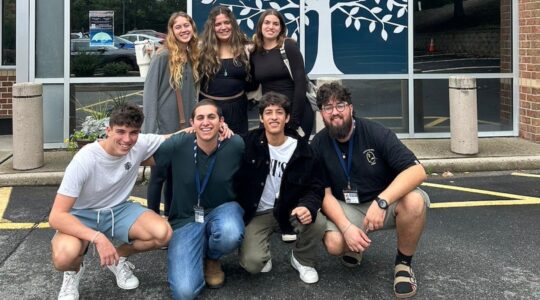TEL AVIV (JTA) – Tatiana Mankov speaks Hebrew, has raised her children in Israel and is married to a Jewish Israeli – but as a non-Jew from Belarus living in Bat Yam who overstayed her tourist visa 10 years ago, Mankov dwells in a bureaucratic no-man’s land.
Because she is in the country illegally, Mankov cannot work on the books, is not eligible for state health care and cannot leave Israel for fear of being barred from returning.
Mankov wants to become Israeli, but after years of submitting applications for citizenship and permanent residency, she says she has not received a conclusive answer from the Israeli government.
“Why do they reject someone who has done no harm?” she asks.
Mankov is among some 11,000 non-Jewish relatives of Israeli citizens who are seeking citizenship or residency status in Israel. They say they are caught in a system that does not want them or know what to do with them.
Some Israeli officials say the government’s ambivalent approach toward these illegal immigrants – not recognizing them but only rarely moving to deport them – is the result of a reluctance to encourage non-Jewish immigration combined with an acknowledgement that Israel should not be in the business of dividing families through deportations.
Ophir Pines-Paz, a former Israeli interior minister, said the lack of a clear policy on non-Jewish immigration is intentional.
“That is the policy – that people will not know what to do so there will be as few non-Jews as possible here,” he told JTA.
Supporters of those like Mankov say Israel has failed to compose a new immigration policy to keep pace with the times, in which immigrants from the former Soviet Union want to bring non-Jewish relatives to Israel, including elderly parents and children from previous marriages.
During his tenure as interior minister, Pines-Paz said, efforts to find a compromise solution failed.
Reut Michali, a lawyer for the Israel Religious Action Center, the political wing of Israel’s Reform movement, said the result is unnecessary hardships.
“The policy is not transparent and it changes frequently. And because there is no policy on immigration, there is no way to deal with people,” Michali said at a recent conference on immigration in Israel sponsored by the Association for the Rights of Mixed Families, which promotes the rights of families with non-Jewish members.
According to the group’s estimates, more than half of those waiting for official status in Israel are children.
Sabine Hadad, a spokeswoman for the Interior Ministry, said the ministry functions according to set procedures but no overarching policy has been set by the Cabinet or the Knesset.
She said that petitioners subjected to long waits for a response to their requests for official status must “have not yet presented the correct paperwork.”
Many Israelis fear that the influx of non-Jewish immigrants threatens the state’s Jewish character.
Michael Kleiner, a leader of the nationalist Herut party and a former Knesset member, said non-Jews should be able to become citizens only in special humanitarian cases or if they have proven their ties and loyalty to Israel. Overall, he said, citizenship should not come easily, warning that a major influx of non-Jews into Israel could result in new churches and an end to the state’s Jewish character.
“It’s in our interest to keep their number a small one,” he said.
Though he acknowledged that “most of the non-Jewish Israelis become part of Israeli society” – referring to the estimated 320,000 immigrants from the former Soviet Union who are not Jewish according to halachah, or Jewish law, but qualified to immigrate under Israel’s Law of Return – Kleiner warned that non-Jewish Israelis would have less incentive to assimilate into Israel’s Jewish culture if there were more of them.
Advocates for more liberal immigration policies say non-Jews integrate well into Israeli society once they’re here.
“These non-Jews see themselves as connected to the fate of the country,” Yossi Beilin, head of the Meretz Party, said. “They feel themselves part of the Jewish state.”
The case of a non-Jewish widower named Sergei Dzhedan recently made headlines in the Israeli media. Dzhedan, the son-in-law of a Holocaust survivor, is the only relative who can care for her. But because he had not completed the naturalization process before his wife’s death, he was threatened with deportation.
“Israel’s real policy is to do everything to block the entry to the country of non-Jews because they are non-Jews,” Israel’s daily Ha’aretz wrote in an editorial on the matter.
“The insufferable bureaucratic bottleneck and the Via Dolorosa traversed by those seeking naturalization assure that the gates are blocked,” the editorial said, charging that the Interior Ministry “is creating countless human tragedies.”
Many of the cases involving non-Jewish petitioners for citizenship are ending up in court.
This month, Judge Judith Tsur of the Jerusalem District Court ordered the Population Administration, the arm of the Interior Ministry that handles status and citizenship, to make its regulations on the matter public within the next month.
The judge excoriated the ministry, saying that for years it has not followed the law or respected court rulings.
“We operate according to the law,” the Interior Ministry spokeswoman responded.
Robert Ilatov, a Knesset member from the Yisrael Beitenu Party, which is composed of immigrants from the former Soviet Union, said he often fields complaints from distressed immigrants – including soldiers – trying to bring a non-Jewish parent to Israel.
“Someone that puts their life in danger for the state has the right to have his parents with him,” he said.





